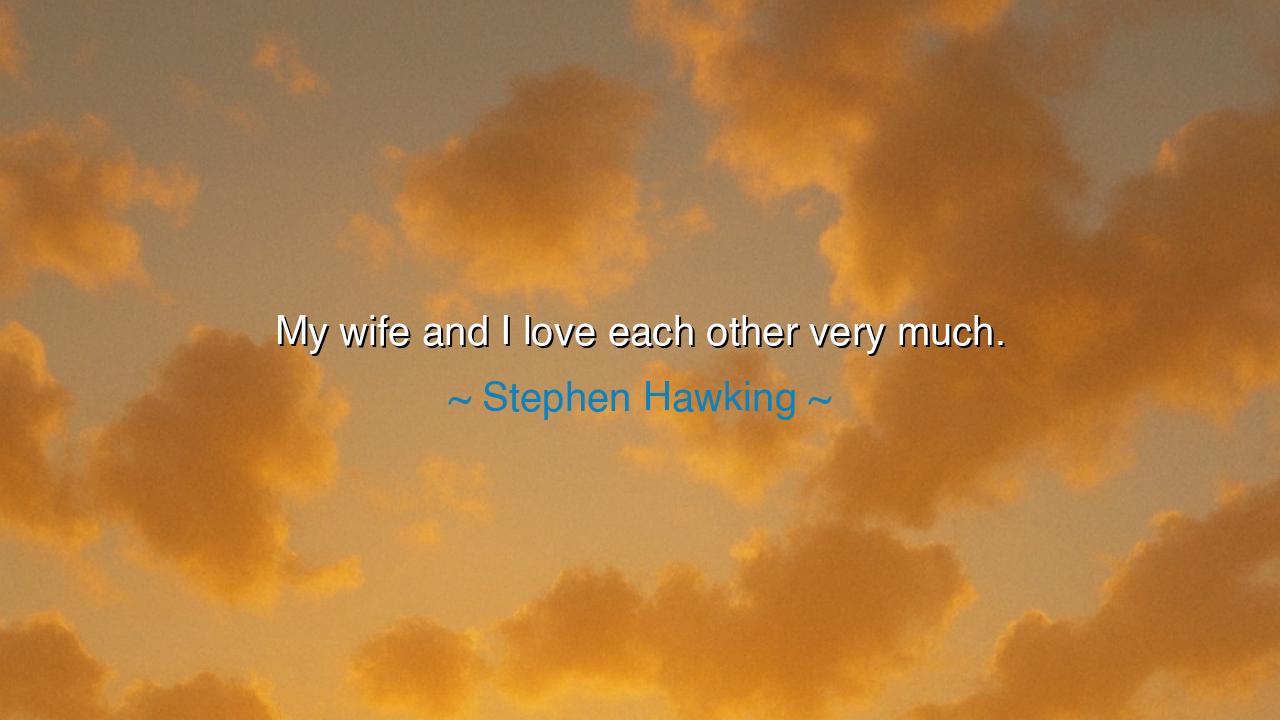
My wife and I love each other very much.






“My wife and I love each other very much.” Thus spoke Stephen Hawking, the man who gazed into the abyss of the cosmos and saw not only the laws that govern galaxies, but the fragile thread that binds human hearts. These simple words, uttered by a mind that dwelt among stars, carry a depth that mathematics cannot measure. For though Hawking’s intellect sought to unravel the mysteries of the universe, his heart testified to the greatest mystery of all — love, that unquantifiable force which endures even when the body falters and the voice grows faint.
The origin of this quote lies in Hawking’s reflections upon his life with Jane Wilde, his first wife. They met in youth, when Stephen was but a student at Cambridge, brimming with wit and wonder, before the shadow of illness had descended upon him. When he was diagnosed with ALS and told he had but a few short years to live, Jane did not turn away. She chose to walk beside him into the unknown. Their marriage, tested by time and trial, became a story of devotion amidst suffering, of two souls joined not by circumstance, but by courage. When Hawking declared, “My wife and I love each other very much,” it was not a boast, but an acknowledgment — that love, when true, becomes not an emotion alone, but a force of survival, stronger than pain, stronger than despair.
In his frail body, Hawking bore witness to the paradox of life: that even when strength and speech fail, the heart may yet overflow. Though machines spoke for him and gravity claimed his limbs, the spirit within him burned bright. He, who charted the birth of stars, knew that love is the fire that outlives even the death of suns. His love for Jane was not the effortless romance of youth, but the steadfast bond of endurance — the kind the ancients would have called sacred. It was forged in the daily acts of patience, in the quiet labor of care, in the thousand small moments where tenderness triumphs over exhaustion.
History, too, bears witness to such love — love that persists not because it is easy, but because it is true. Consider Marcus Aurelius, emperor and philosopher, who once wrote of his wife, “I thank the gods that she was so loving, so patient, and so faithful.” Like Hawking, he understood that the greatness of a life is not only in power or wisdom, but in companionship — in the ability to find, within another soul, a mirror of one’s better self. Or think of Frida Kahlo and Diego Rivera, whose love, though storm-tossed, remained a source of creation and meaning. In every age, the human heart has sought not perfection in love, but endurance through it — the will to remain when others might flee.
Hawking’s words also reveal a profound humility. The man who spoke of black holes, time warps, and the origins of the cosmos could have surrounded himself only with ideas. Yet he spoke first not of theories, but of love. In that, he showed us that even the greatest intellect must bow before the mystery of affection. The mind explores the stars; the heart keeps us human. Without love, even the most brilliant discoveries turn hollow. With love, even suffering becomes luminous. His simple statement — “My wife and I love each other very much” — is thus an equation of the soul, one that reminds us that connection is the true measure of existence.
Yet love, as Hawking’s life reminds us, is not without strain. His marriage to Jane endured hardship — the weight of illness, the burden of fame, the exhaustion of years. It was not untouched by sorrow or division. But perhaps that, too, is part of his message. Love is not immortal because it avoids breaking; it is immortal because it endures even after breaking. It transforms, it evolves, it remains in memory, gratitude, and grace. For even after their marriage ended, Hawking’s respect for Jane — and hers for him — remained a testament to what they had built together: a partnership that defied despair.
The lesson, then, is both simple and eternal: that love is not the luxury of the strong, but the salvation of the weak. It is the power that restores meaning when the body falters and time grows cruel. To love another “very much,” as Hawking did, is not merely to feel — it is to commit, to act, to give without measure, and to receive without pride. It is to stand side by side against the vastness of existence and whisper, “We are enough.”
Therefore, my friends, remember this: knowledge may unlock the secrets of the stars, but only love gives life its purpose. Cherish those who walk beside you, not for what they give, but for what they are — mirrors of your own humanity, companions on the journey through the infinite. For in the end, as Stephen Hawking taught both through his science and his heart, it is not brilliance or power that endures — it is love, the one force that binds not only the universe, but every soul within it.






AAdministratorAdministrator
Welcome, honored guests. Please leave a comment, we will respond soon